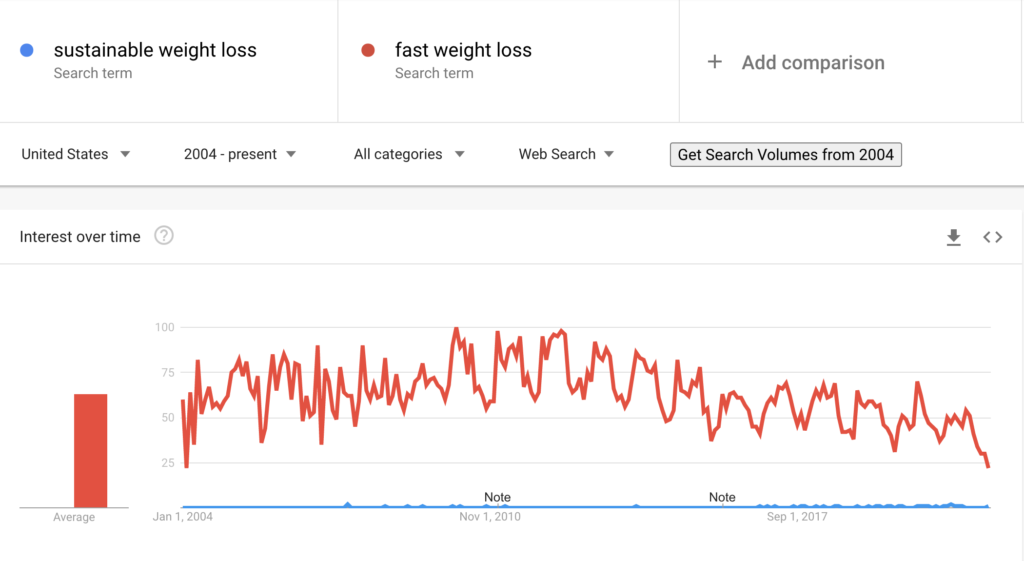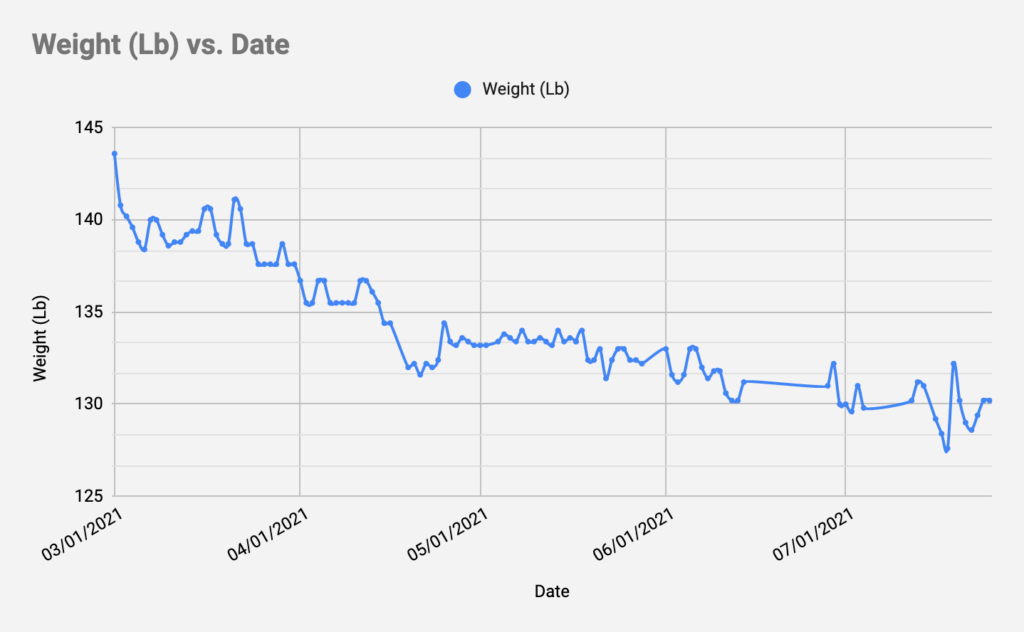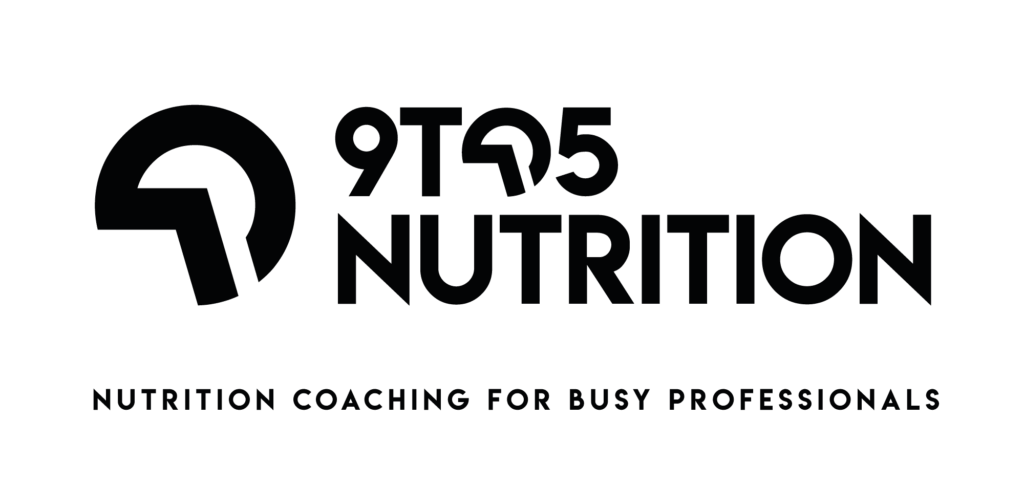- How Much Weight Can You Realistically Lose in 3 Months? - January 14, 2024
- How To Lose 1kg a Week (Guaranteed) - August 20, 2023
- How To Count Calories (or Estimate) and Stay on Track When Eating Out at Restaurants - July 25, 2023
For the vast majority of people, a sustainable rate of weight loss will be approximately 1% of their current body weight per week. This means if you currently weigh 100kg (220lbs), you should be looking to lose around 1kg (2.2lbs) per week. You can of course go slower or faster than this, but any slower likely won’t be enough to sustain motivation, and any quicker will mean the need to have an aggressively low-calorie intake, which will likely be unsustainable in the long term.
When most people decide it’s time for them to lose weight, they’ll start trying to find ways to lose weight as quickly as humanly possible.
This makes sense; why would you want to wait around to get results?

The problem is, when it comes to weight loss in order to get fast results, you’ll need to eat and therefore live in a way that you wouldn’t be able to sustain for a long period of time.
Let’s use the Keto diet as an example.
Eating keto style will allow most people to lose weight quickly. This is because the Keto diet dictates that you cut out all carbohydrates and sugars. That means no rice, bread, pasta, and very little fruit and veg.
Since carbohydrates make up a large percentage of calories in most people’s diets, cutting them out completely will mean eating a lot less calories, which will result in weight loss over a period of time (providing activity levels stay the same).
Great.
You lose 10lbs and you’re happier with the way you look. But what now? Do you carry on not eating ANY carbs for the rest of your life? Of course not.
You’ll go back to eating carbs again which puts you back to the calorie levels you eating pre-weight loss, and gradually you’ll put all the weight back on, then you’re back at square one and you’ve wasted 6-12 months.
You either give up and tell yourself that ‘diets don’t work for me’ or you’ll just keep Yo-Yo Dieting indefinitely.
WHAT YOU SHOULD DO INSTEAD OF FAD DIETS?
If you follow these steps now and avoid fad diets altogether, you’ll be in a much better place in 6 months, a year, 18 months and pretty much the rest of your life.
Think about it, would you rather waste years trying out extreme weight loss diets and getting stuck in an endless cycle of yo-yo dieting, or would you rather spend a good 6-12 months dieting slowly while developing all the habits you need to keep that weight off forever?
If it’s the former, I recommend you follow these steps;
- START DEVELOPING HEALTHY HABITS
Before you start any formal weight loss efforts, put in place some easy, replicable habits that you KNOW you can stick to. There are tons of weight loss habits you can implement, and different habits will suit different people, but the ones I recommend for everyone are;
- Eat 3 square meals a day
Doing this will mean you’re less likely to skip breakfast or lunch and binge on dinner. The evening is when most people overeat on calories, so if you’ve fed yourself sufficiently throughout the day excess calorie consumption in the evening is far less likely to happen
- Eat a portion of fruit or veg at every meal
Vegetables and most fruits have are low calorie-dense foods. This means that they contain very few calories per gram, and are therefore filling while making a small dent in your daily calorie total. Including a portion at every meal will help keep a cap on your hunger levels, making you less likely to overeat
- Eat a portion of protein at each meal
Protein is good for weight loss. It’s filling, helps keep you full, and you’ll burn more calories digesting protein than you do carbs or fat, including some form of protein at every meal. I recommend eggs or low-fat yogurt at breakfast, tuna or eggs at lunch, and chicken, fish or red meat for dinner. Protein shakes can help fill the gaps.
- CALCULATE YOUR THEORETICAL CALORIE DEFICIT
It’s fairly common knowledge now that a calorie deficit is effort is required for weight loss. This is great, but most people don’t actually know how a calorie deficit works, and even fewer people know how to implement it and maintain it long term.
My recommendation is to calculate your maintenance calories, then subtract 20% from that number. So, if you maintenance calories are 2,000 per day, you’d subtract 400, giving you 1,600 calories. This is your theoretical deficit.
- SET A CALORIE AND STEP GOAL
Once you have your theoretical deficit, set it as your daily calorie goal. Get as close to that number as you possibly can (while following the habits from step 1). While you’re at it, set yourself a step goal. There’s no ‘magic’ number of steps you need to do to lose weight, just pick a realistic number (I recommend 4,000 per day as start point) and build on it of you need to.
- TRACK EVERYTHING
Track Your weight, calorie intake and steps on a daily basis. If you don’t track, you’ll have no idea if you’re sticking to your targets, and if those targets are working for you. It takes 5 seconds to weigh yourself each morning and record it in your phone and zero effort to track your steps if you have a Fitbit or Apple Watch.
WHY SLOW WEIGHT LOSS IS BEST
Losing weight slowly might not be cool or sexy, but it’s much easier than trying to drop several pounds a week.
The more weight you want to lose, and the quicker you want to lose it, the more aggressive you’re going to need to be.
Any form of weight loss is going to require some level of sacrifice, but you need to get the balance between sacrifice and results just right. Make too many sacrifices and you won’t be able to adhere to your diet, don’t make enough sacrifices and your results will be poor and/or too slow.
Adherence really is the key word here, because no matter what habits you choose to implement, or what calorie and step targets you set yourself, if you can’t adhere to it long term (I’m talking at least 4-6 months), you’ll fail.
I’d rather set my clients easy targets they can achieve consistently rather than over-ambitious ones that they have no chance of sticking to.

If you can’t get anywhere near your targets, you’ll get demotivated and quit altogether.
One other disadvantage to consider when it comes to rapid fat loss, is the risk of muscle loss. I get it, you ‘don’t want to be a bodybuilder, not many people do. But whoever you are, you should be looking to hold on to as much muscle as you possibly can.
Muscle mass is important for everyday activities like DIY or carrying shopping, sports performance, overall general health, metabolism, and of course looking good. If you diet rapidly, the likelihood is you’ll lose a lot of muscle tissue as well as fat, and end up looking ‘skinny fat’, i.e. someone with a slim frame, but very little definition.
Indeed, this study found that participants who lost weight slowly (0.7% of their body weight per week) were more likely to retain lean body mass than participants who lost 1.4% of their weight per week.
If this happens you’ll like just end up wanting to ‘recomp‘, or start the long and arduous process of muscle building (which often goes along with weight gain).
Do things slowly and sustainably from the offset and you won’t need to worry about this further down the line.
HOW SLOW SHOULD YOU GO?
For the vast majority of people, I’d recommend aiming to lose roughly 1% of your body weight per week.
That means at 100kg, you should aim to lose around 1kg per week.
If you’re 80kg, you should aim to lose 0.8kg per week
And if you’re 60kg, you should be aiming for 0.6kg per week.
Using the 1% method is much better than having a blanket target like ‘ I should be losing 1kg per week’. This is because the lighter you are, the harder is to lose weight because you simply have less to lose.
Your weekly weight loss targets should reduce, as your weight reduces.
Having said that, a blanket ‘1kg’ is a simple and easy target and can work even for very light people.
You can of course go over that 1% target, but I personally wouldn’t go anywhere above 2% per week, at least for long periods of time.
This study confirms that obesity treatment guidelines dictate that weight loss and management programs should go on for at least one 1 year given the likelihood of weight loss patients to relapse.
CAN FAST WEIGHT LOSS EVER WORK?
Of course, there are always unique cases out there, and there are people who can cope with consistently fast weight loss.
I’d class ‘fast’ weight loss as anything above 2% of current body weight loss per week.
This level of weight loss is difficult but not impossible to maintain for the long term, people this might work well for are;
- People with plenty of time on their hands
- People who are very in tune with their hunger levels
- People who are able to have a high level of control over their food environment, e.g people that work from home
People that are starting off very obese may also be suitable candidates for fast weight loss, simply because they have a lot to lose, and the quicker they can get the excess weight off, the sooner they’ll be healthy.
Of course, there’s nothing wrong with mixing up slow and fast approaches to weight loss. With some clients, I’ll have their calorie targets very low at the start of their diet to price some initial;, quick weight loss. There are two main benefits to this approach;
- For people new to calorie tracking, it means they gain a very quick understanding and appreciation of the mechanics behind a calorie deficit. For people who have historically used ‘fad’ diets, there may be some skepticism behind calorie tracking so if very low initial starting calories get them a result, they’ll ‘buy in’ to the process much quicker and often be more successful in the long term.
- Seeing the scale move is motivating! If that’s what it takes for people to get past those tricky first 2-3 weeks then so be it. This Austrailian study carried out on 204 people found that rapid weight loss lead to more motovation among the participants
Starting out on very low calories isn’t for everyone, however, and may be too much of an initial shock for some people.
The other option is to implement what I call ‘blast’ weeks where we drop calories much lower than their normal levels roughly every 4-6 weeks to temporarily accelerate results before going to back the original calorie deficit.
SUMMARY
Yes, we all want to lose weight as quickly as possible, but on the whole, the methods that result in the quickest results, i.e. restrictive diets are NOT sustainable in the long term.
If you want weight loss for life, and a result that you can hold onto without eventually regaining all the weight you lost, then you need to diet in a sustainable way, i.e. a way that that you can maintain indefinitely.
For the majority of people this is NOT;
- Keto
- Veganism
- Diary-Free
- OMAD (One Meal A Day)
- Intermittent Fasting
- Paleo
- Weight Watchers
All of the diets rely on a ‘method’ (usually cutting something out completely, whether a food group or eating at a certain time of day) rather than the underlying principle of a ‘calorie deficit’ that can be applied in a flexible way to suit your lifestyle.
Fast fat loss can work for isolated periods of time, but in the long-term diets need to be sustainable unless you want to regain all the weight you lost OR just not eat carbs, diary or meat for the rest of your life.
And who wants that?!
REFERENCES
Maintenance of lost weight and long-term management of obesity: https://www.ncbi.nlm.nih.gov/pmc/articles/PMC5764193/
Effect of two different weight-loss rates on body composition and strength and power-related performance in elite athletes https://pubmed.ncbi.nlm.nih.gov/21558571/
The effect of rate of weight loss on long-term weight management: a randomised controlled trial: https://pubmed.ncbi.nlm.nih.gov/25459211/

Leave a Reply